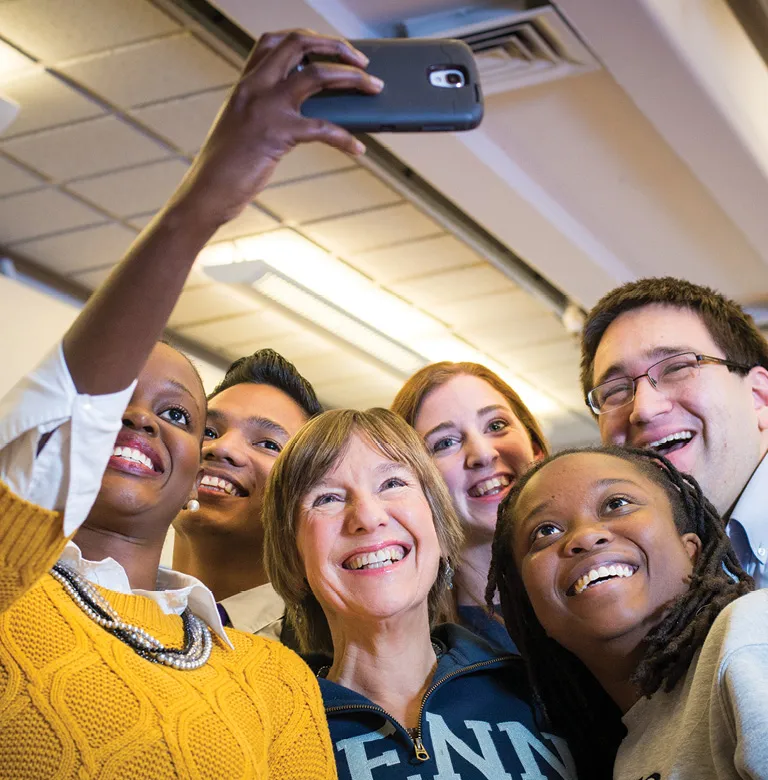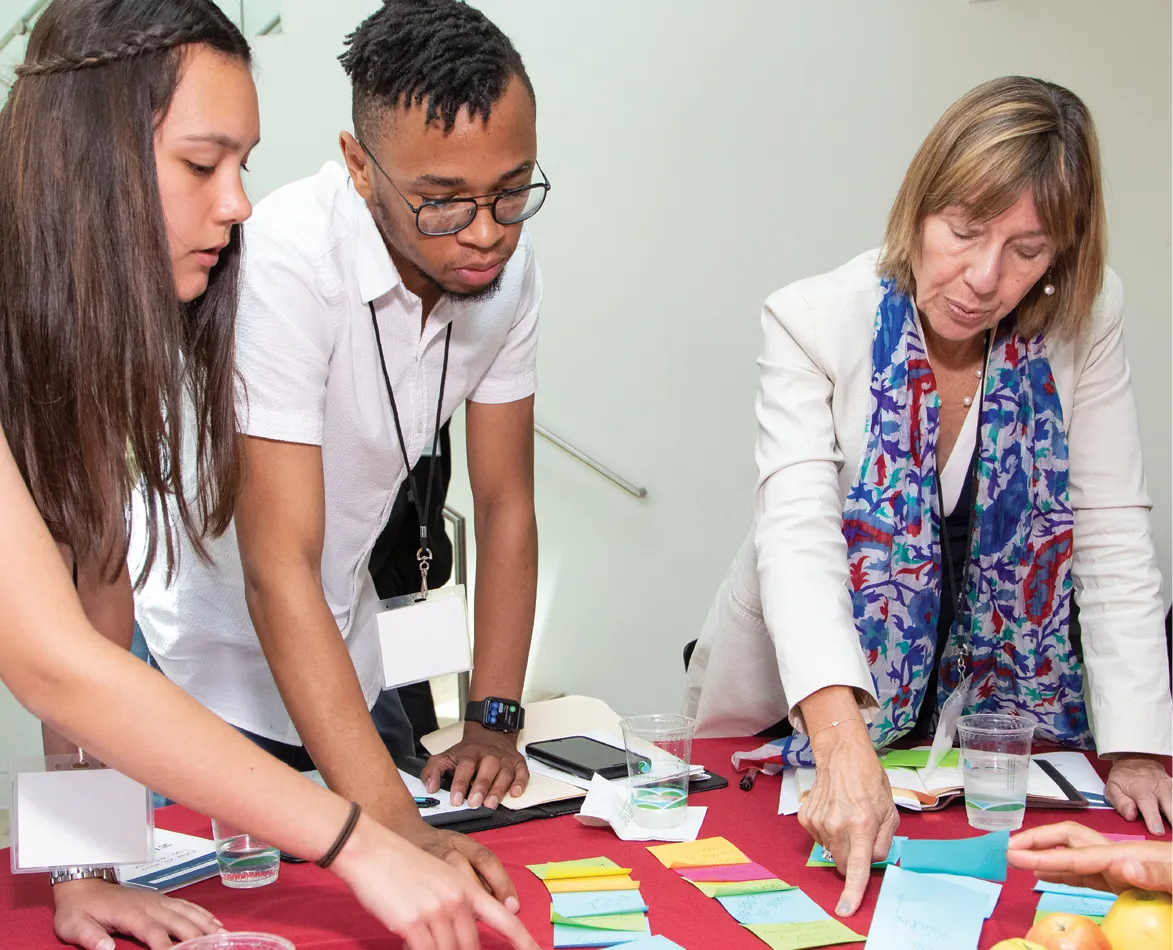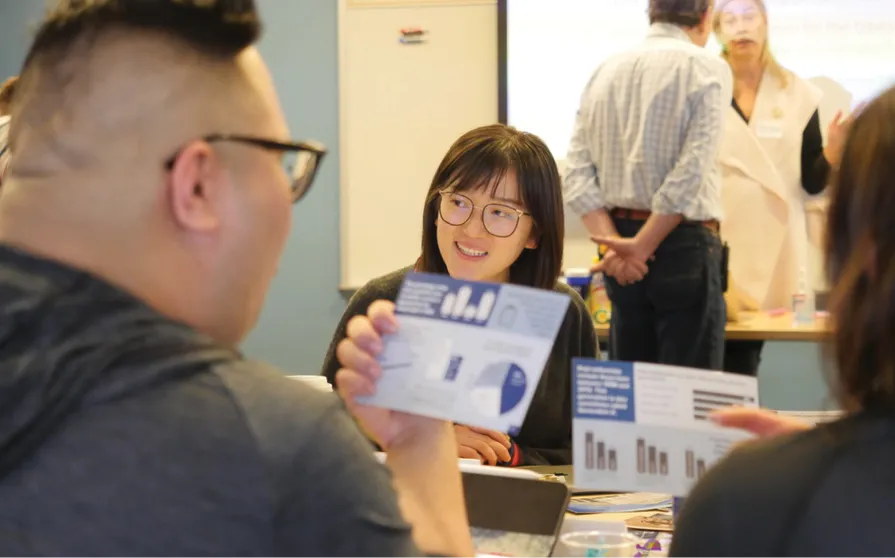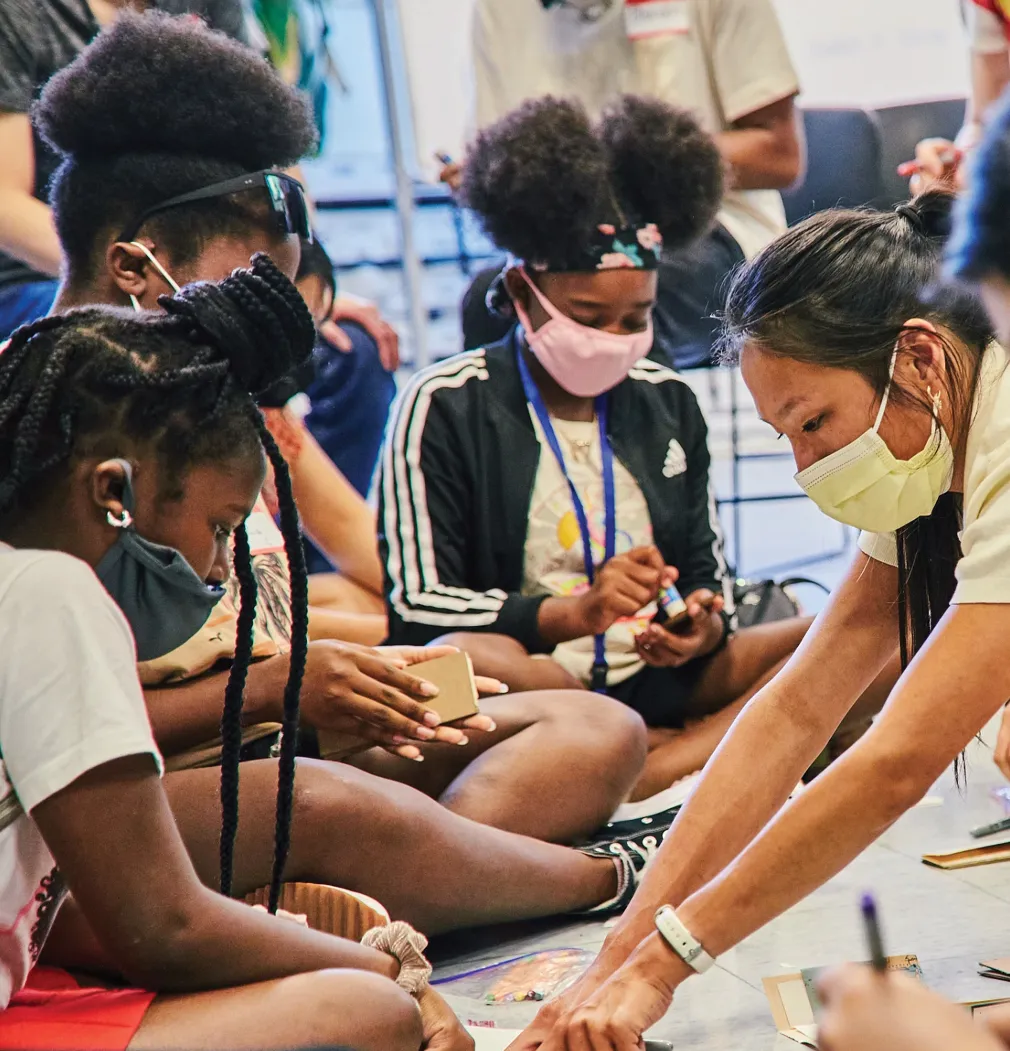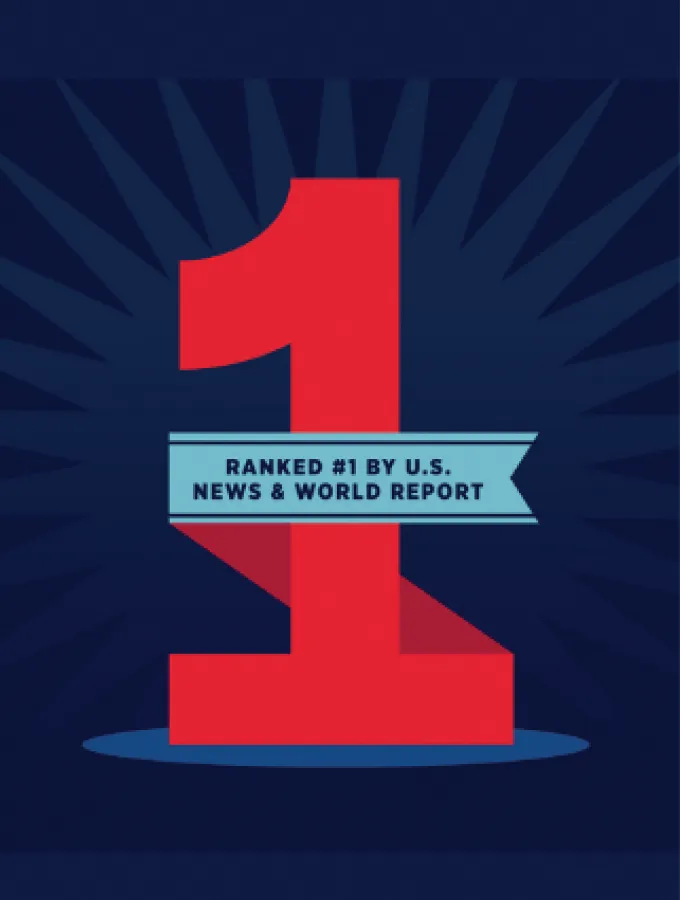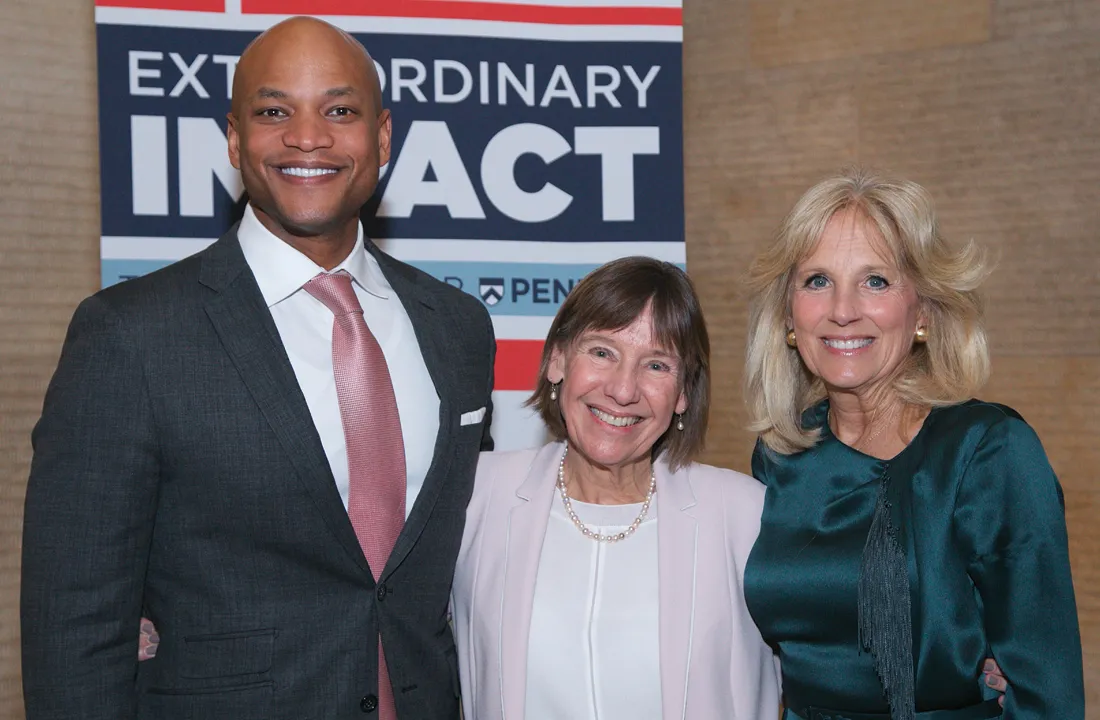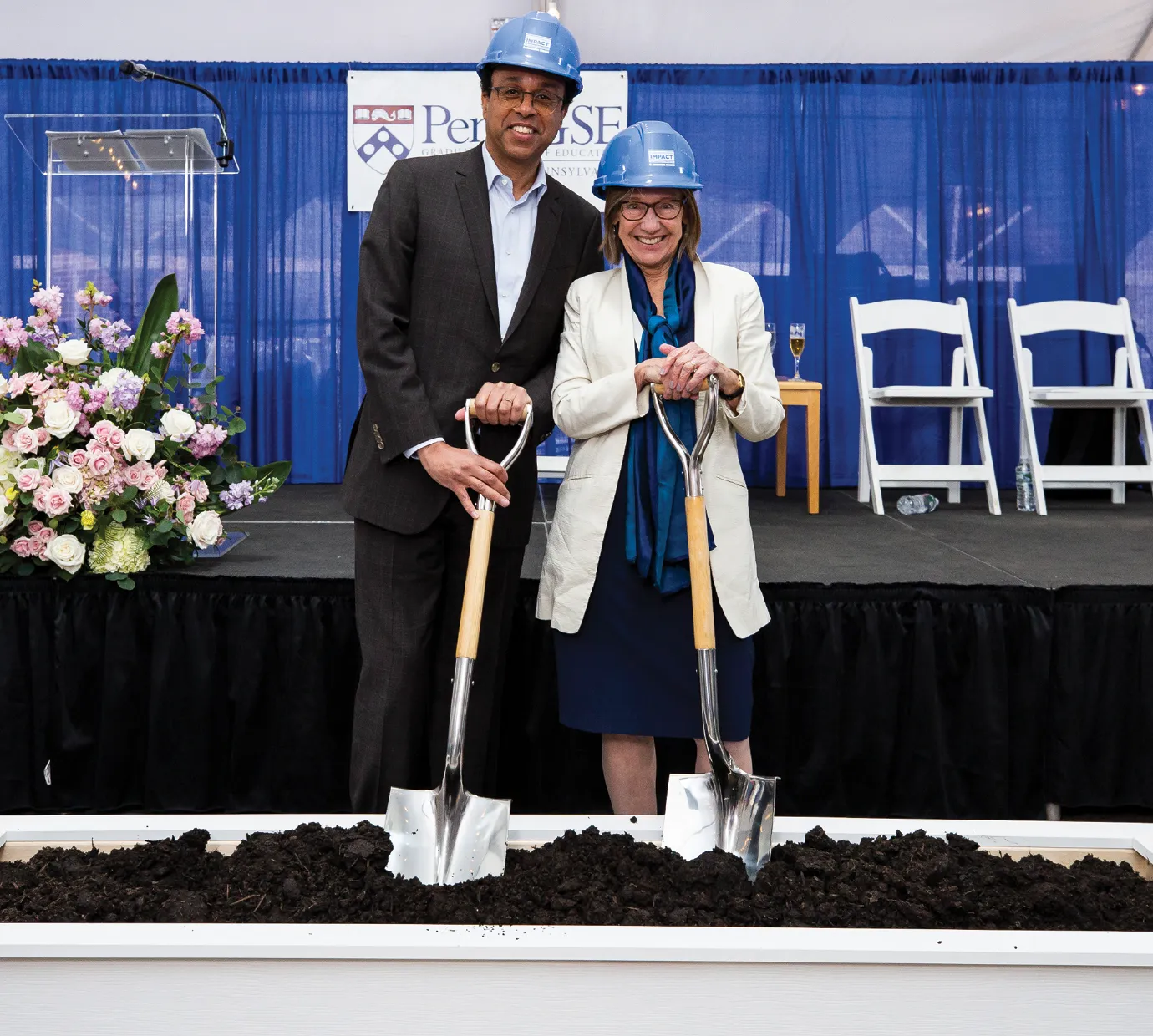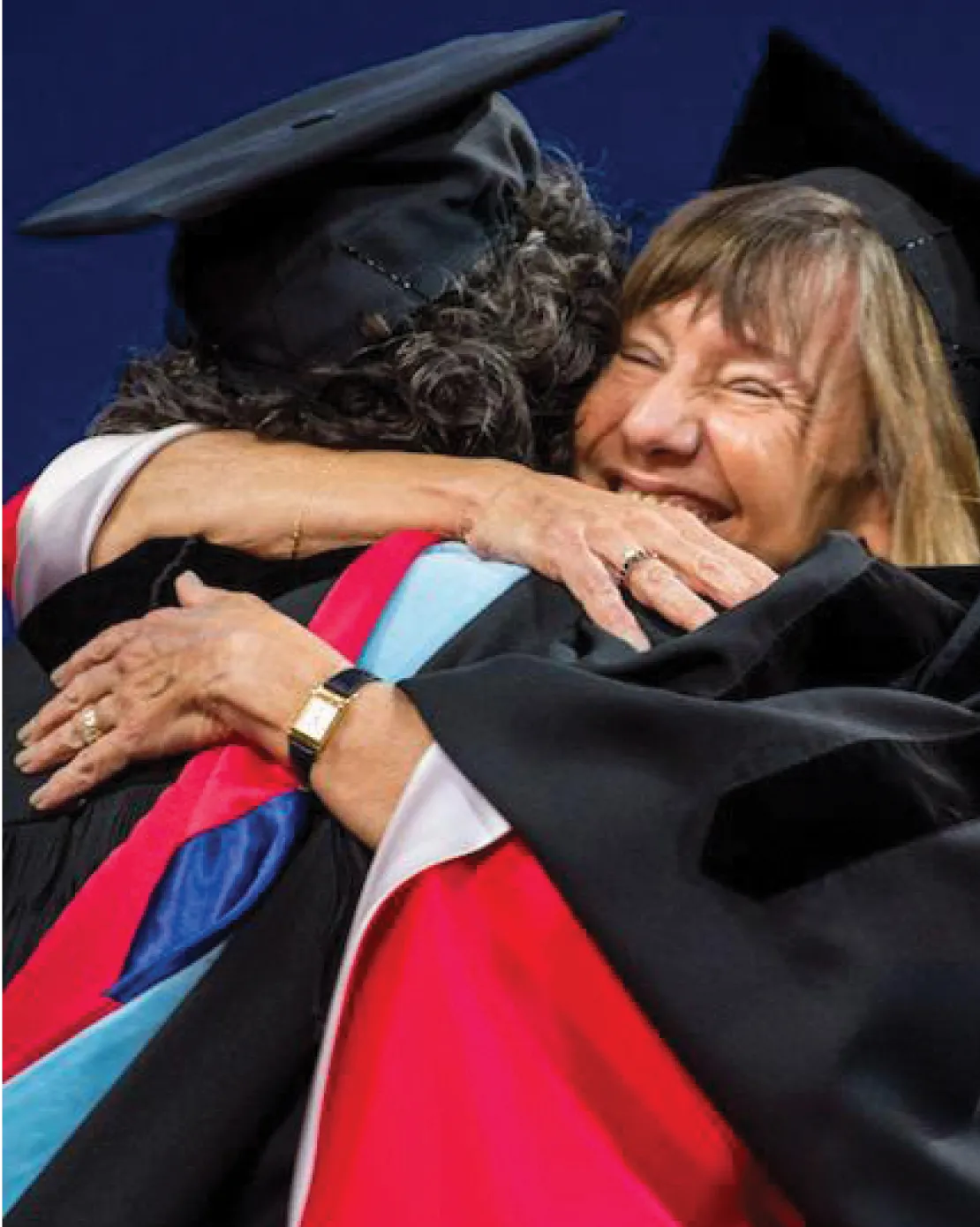A Legacy of Leadership
ine years ago, on September 19, 2014, the Penn GSE community came together to celebrate the School’s Centennial, reflecting on how far it had come from its initial 97 students, three faculty members, and nine courses. The kickoff for what would be a yearlong 100th birthday party featured the requisite cake, balloons, and music. But it also included one very important attendee: Pam Grossman, a scholar of teacher education from Stanford University’s School of Education who was soon to become Penn GSE’s newest dean.
Grossman, who began her career as a high school English teacher, had never planned to be a dean—in fact, she had previously turned down other offers so she could continue teaching and advising doctoral students at Stanford. But she felt a pull to lead Penn GSE, compelled by its unique partnerships with the School District of Philadelphia and the potential to make a real, tangible impact.
“It was a big leap for us, particularly because I’m from the Bay Area and had never spent time in Philadelphia, so there was a lot of learning to be done,” Dean Grossman said. “But if you care about urban education, which I do, it really helps to be in a city.”
She officially became dean in January 2015, leading the School into its second century. During the busy years that followed, change was the only constant. Some of it was actively pursued—such as the fundraising and groundbreaking for a new building expansion. And some of which—namely the COVID-19 pandemic—could never have been foreseen. But Dean Grossman steered the School through it all with a steady hand, aspiring to create an inclusive community devoted to academic excellence, innovation, local engagement, and international impact.
“As a global leader in the field of education, Pam, not surprisingly, has a passion for improving our educational systems at every level. Through her leadership, GSE has cemented its place among the top schools of education,” said Wendell Pritchett, GR’97, who served as provost and interim president of the University during her tenure as dean. “Pam has also been a crucial collaborator in our University efforts to create an even more meaningful educational experience for our students.”
The breadth of all she has accomplished came into sharp relief when she announced the bittersweet news that she would be stepping down this summer.
“Dean Grossman is leaving the school in exceptionally good shape,” said Penn GSE’s Chair of the Board of Advisors Doug Korn, W’84. “We have tremendous momentum programmatically, academically, organizationally, and reputationally. By the end of Pam’s term as dean, the School’s physical plant—its learning spaces and public areas—will have been expanded and completely updated to contemporary standards. The School is objectively bigger, better, stronger, and more financially sound than ever.”
“Pam Grossman is an admired teacher, scholar, and leader with an exceptional track record at the helm of Penn’s world-renowned Graduate School of Education,” said University President Liz Magill. “She has made an indelible mark on Penn GSE, shepherding a significant expansion and renovation project, leading an ambitious fundraising campaign, growing student enrollment, and supporting a strong and committed community that values education to the highest degree. In too many ways to name, her mark will be felt for years to come.”
BY THE NUMBERS
In some ways, it is hard to quantify all that Dean Grossman has done for Penn GSE over the past eight-and-a-half years. All of the mentoring, supporting, recruiting, listening, and collaborating has changed the School’s culture and community—but the numbers do tell a story of her priorities for Penn GSE and its growth in size, reputation, and capacity.
Both applications to the School and its enrollment have skyrocketed during her tenure. Since 2015, applications to the master’s programs have grown more than 115 percent, and overall enrollment is up more than 20 percent. Thanks to Penn GSE’s expanded global impact, international students now represent close to 40 percent of current degree students, up from approximately 21 percent in 2015, and this year’s applicants came from more than 80 countries around the world.
With this growth, Dean Grossman prioritized the need for robust financial aid—and more of it. She introduced need-based aid during her tenure, and in 2022, 73.5 percent of admitted master’s students were awarded some type of aid. The average award is now more than 50 percent greater than it was in 2015.
Another priority was diversifying Penn GSE’s faculty and student body to be more reflective of the world outside its doors. Dean Grossman hired 19 of the now 40 standing faculty members, with 48 percent of the current overall faculty identifying as a person of color. That faculty now teaches a student body in which 47 percent of domestic degree students identify as people of color.
Under her leadership, she launched new offices and initiatives dedicated to key areas at the School: partnerships with the School District of Philadelphia (the Office of School and Community Engagement), educational innovation (Catalyst), teacher preparation and professional development (the Collaboratory for Teacher Education, the Center for Professional Learning), and antiracism and equity priorities (HEARD: The Hub for Equity, Anti-Oppression Research, and Development; the Committee on Race, Equity, and Inclusion).
Even before this progress, Penn GSE had outgrown its modest campus footprint. With offices and classrooms spread across University City, the School did not have the space to house all its new students, faculty members, and offices in one building. Keen to foster a close-knit community, Dean Grossman unveiled her vision for “One Penn GSE” and set out to fundraise more than $13 million in capital contributions for an expansion that will bring most of the School under one roof later this year.
“I wanted to build a ‘One Penn GSE,’ where there’s room for our students and our faculty and our staff to work together, to collaborate,” she said. “I think it represents the future of the School and a vision for the School of how we can bring people together in a way that we have not been able to do, and that’s what I’m most proud of. It’s not just the physical building, it’s the community that it represents.”
FUNDING HER VISION
But big ideas need big backing. Dean Grossman oversaw the largest capital campaign in Penn GSE history, which surpassed its $75 million dollar goal by almost 30 percent.
“We raised close to $100 million for GSE to transform the School,” said Korn, the campaign chair. “The name of the campaign was Extraordinary Impact, and when I think back, that’s the way I would describe Pam’s impact on GSE—it was truly an extraordinary impact.”
Dean Grossman also received the largest single gift in the School’s history—a $16.25 million commitment from the Harold W. McGraw, Jr. Family Foundation—which created the new McGraw Center for Educational Leadership and expanded existing support for the Harold McGraw, Jr. Prize in Education that has been housed at the School since 2020.
“Our family has been honored to work with Pam Grossman to support and advance the mission of Penn GSE,” said Harold McGraw III, WG’76, the former chairman, CEO, and president of the McGraw Hill Companies. “Her intellect, dedication, and spirit of innovation has left an indelible mark on Penn GSE and the broader education community. The new McGraw Center for Educational Leadership is one of many examples of her commitment to developing future generations of outstanding leaders spanning all types of education.”
GLOBAL REACH, LOCAL IMPACT
A primary focus for Dean Grossman—from day one—was to grow and formalize the connections between Penn GSE, Philadelphia schools, and the neighboring community.
“What Pam did was she put school and community engagement at the center of our mission at GSE. Creating a formal office to facilitate [these relationships] was a sign of the School’s commitment to that mission,” said Caroline Watts, director of the Office of School and Community Engagement (OSCE).
OSCE, founded in 2016, is a national model of a university–school district partnership. It launched the Responsive Math Teaching project, which is building capacity in mathematics instruction in all K–8 schools in West Philadelphia. The office, in partnership with Penn’s Netter Center, started a summer program in 2021 to rebuild students’ connection to and preparation for school amid pandemic-disrupted learning. (That program has already served nearly 500 students in grades 1–8.) OSCE also just developed an intensive tutoring program, launched the Alliance for Interprofessional Education to support educators, and is the locus of support for the Penn partnership schools: Penn Alexander School and Henry C. Lea School. Dean Grossman was instrumental in spearheading a new landmark partnership with the district and the Philadelphia Federation of Teachers to formalize support for the Lea School in 2022.
“Pam not only helped facilitate connections and collaboration between Penn GSE and the School District of Philadelphia, but her thoughtful and considerate approach to the partnership helped both Penn and the district think about the various needs throughout our system and how Penn could support those needs,” said Michael Farrell, chief learning officer for the district, current doctoral student, and adjunct instructor at Penn GSE.
“Through Pam’s leadership, GSE has dramatically accelerated its connections to the School District of Philadelphia and schools in the region,” said Pritchett. “GSE is connected to schools across the city and at every level. We are training leaders. We are training teachers. We are supporting after-school programs, and we are in the schools. We are supporting the curriculum enhancements during the day. I’m just very proud of all of the work that we, as the University, are doing, particularly the work that GSE is doing.”
Those collaborations have reach beyond Philly’s borders. The dean’s goal, said Director of Development and Alumni Relations Jane Lindahl, GED’18, is for Penn GSE’s work throughout Philadelphia to inspire innovative solutions that prepare students everywhere to thrive in an increasingly interconnected and changing global community.
“We will always have a commitment to the city of Philadelphia,” said Lindahl, “but we can also take what we learn as an institution and share it broadly to help communities globally.”
BUILDING AN INCLUSIVE COMMUNITY
Dean Grossman also cares deeply about the community inside the School. Fostering a supportive and inclusive culture at Penn GSE has been a cornerstone of her tenure.
“After 2020, post-George Floyd protests, she really put effort into rebuilding community and addressing issues of racial justice, and she put resources into that,” said Associate Professor Amalia Daché. “She led us in making affinity groups across the GSE. And that takes vision.”
“She did a lot of community-building work,” said Deputy Dean, Professor, and Board of Advisors Chair of Education Matt Hartley. “She brought us together, had conversations about what was important to us, who do we want to be as a community? What difference do we want to make in the world? And I think that’s been one of Pam’s most important contributions to the School—engaging the whole community, faculty, staff, and students, in these conversations around purpose.”
One way she professionalized this work was by creating roles to manage it.
“Under Dean Grossman’s leadership, there were two new and important positions that were introduced to Penn GSE: the [assistant dean for diversity, equity, and inclusion] and the chief people officer,” said Miriam Harris, financial administrator and member of the Committee on Race, Equity, and Inclusion. “Prior to Dean Grossman, there was no dedicated HR executive to address the needs of the staff. Now, Penn GSE has staff career development and training devoted to [building this culture]. . . and improved collegial relationships.”
“Pam’s lasting impact will be the positive work culture she has helped create and sustain,” said Emma Grigore, LPS’16, ML’20, Penn GSE’s inaugural chief people officer. “Her commitment to people-centric policies and procedures has paved the way for continued growth and engagement at the School.”
Dean Grossman instituted regular staff meetings, and many faculty members noted that she transformed how they met, collaborated, and connected.
“The way she structured the faculty meetings, the faculty retreats, different committees—she’s really tried to make community and connection central,” said Associate Professor Sharon Wolf, C’06. “It has really shifted the atmosphere. I definitely enjoy faculty meetings more because I just think they’re more productive, less contentious than they used to be.”
“I think Pam really puts us in positions to work together to try to work across groups, to try to work across disciplines and to work together as a larger faculty,” said Watts. “That’s not easy.”
She also sought to create community among students, many of whom are at Penn GSE for a short time or may feel siloed in their programs. She supported the creation of—and later co-taught—a new course for first-year doctoral students because she noticed a lack of a shared cohort experience.
“For a lot of us, our departmental PhD cohort is one to two people each year, so meeting other first-year [doctoral students] from across GSE was critical to finding community here,” said Elizabeth Dunens, GR’23. “With the pandemic beginning the following semester [after I had the class], having this core group of friend-colleagues was a big part of getting through this very challenging time for me, as I had just moved to Philly. This community wouldn’t have existed without this course.”
CARE THROUGH CRISIS
Certainly, when Dean Grossman decided to lead Penn GSE, she could not have foreseen the global pandemic that would shut down in-person instruction for over a year. She, along with her senior leadership team, had to make decisions and communicate clearly in the face of overwhelming uncertainty and fear. Many students and faculty said that she was a model of leadership in that precarious time.
“I have gotten to observe and learn from Dean Grossman’s leadership of GSE during the pandemic,” said Dunens, who studies higher education leadership, governance, and decision-making. “COVID-19 was the kind of crisis that no one had a playbook for, with very limited and rapidly changing information, especially in spring 2020. Although leaders often were in a holding pattern with decisions . . . it meant a lot to hear regularly from the dean, and with messaging that was clear a lot of care went into.”
Penn GSE found hotel rooms for students who couldn’t go home—either because borders had closed or for personal reasons—and paid for them. The School offered pass-fail options that first spring and let students know about Higher Education Emergency Relief Fund grants for those with exceptional financial need. At every turn, communication was prioritized.
“As a student, adjunct, and partner of GSE over Pam’s tenure, I saw Pam’s leadership impact GSE’s responsiveness to community need in a humanistic approach that centered people first before attending to the underlying issue,” said Farrell. “I saw this on a large scale during dramatic shifts in response to COVID and the approach to handling one-off situations. Her teacher-at-heart mentality was always present in her leadership.”
Not only did Dean Grossman have to figure out a way to keep her students, staff, and faculty safe while still delivering the promised excellent education and inclusive community, but as the leader of a top graduate school of education, educators were looking to her for guidance on how to transition to online learning. Penn GSE made ongoing online resources available to the public—including two on mental health and leadership—which benefitted more than 14 million students and 100,000 educators nationally.
THE PEOPLE MAKE THE PLACE
Her compassionate response to a public health crisis is just one way that Dean Grossman’s people-centered approach has benefited the Penn GSE community. Colleagues repeatedly described her as a listener who leads by consensus, a connector who brings people together, a high achiever with lofty expectations for everyone (including herself), and a teacher above all else.
Doris Juarez, GED’23, a first-generation student with dreams of becoming a college president, was surprised by the time that Dean Grossman dedicated to discussing the School’s higher education program with her when she was considering Penn GSE’s offer of admission. So, she was doubly surprised when she arrived on campus and was personally greeted by the dean with a hug and a request to take a selfie. Since then, the dean has introduced Juarez to alumni who are higher education leaders and helped her network to help make her dream a reality.
“I’m just very grateful that, even though she’s not my professor and I’ve never taken a class with her, she’s been putting my name into different situations that allow for my professional development,” said Juarez. “It’s also really cool to have someone that says, ‘OK, I see your vision right here … and I’m going to try to help.’”
Tamir Harper met Dean Grossman when he was a high school student at nearby Science Leadership Academy and told her his dream was to earn a PhD from Penn GSE. She offered him words of encouragement that continue to fuel him to this day. Since then, Harper earned his BA from American University, kept in touch with the dean, and returned to his hometown to join the Urban Teaching Apprenticeship Program at Penn GSE, where he is working towards his master’s while teaching at Henry C. Lea School.
“Why do I do this work? Why do I come to school every day? Why do I put my best self forward in front of my [classroom] every day?” Harper said. “Because Dean Grossman took time out of her day to say that one day I can become a Penn graduate, and she believed in me. So, my students deserve that same respect, opportunity, and encouragement that she gave me as a young student.”
She sees the faculty and staff of Penn GSE as whole people, not just as their job descriptions, and she encourages them to have rich lives and families outside of Penn and to bring their authentic selves to their work.
“I speak Spanish, so sometimes my emails will be kind of in Spanish and English,” said Daché. “And I know she’ll respond in Spanish . . . It’s nice because it allows me to bring my culture and my language into a professional context, and I know that Pam appreciates that and supports that.”
“She is so supportive of family life,” said Wolf. “She always talks about how she had children in graduate school and how she navigated that and encourages students to build their personal lives alongside their professional lives—and that’s not the advice everybody gets in academia.”
Numerous professors mentioned the lasagnas and baked goods that showed up on their doorsteps handmade by their boss after they had a child or experienced another significant life event. (And those baked goods are excellent. “She’s a really good baker,” confided Professor Sigal Ben-Porath. “She has the most amazing cardamom cake recipe.”)
All that Dean Grossman has managed to achieve for and with Penn GSE during her tenure—the growth and the partnerships and the funds raised and the new building—has all been in service of its people. And it is those people and that community that she said she is going to miss the most.
THE FUTURE IS BRIGHT
“I think Pam’s legacy is going to be that she really brought us together as an academic community and that she really was able to achieve that ‘One GSE’ vision,” said Hartley. “It’s manifested physically in the building, but I think, more importantly, it’s manifested in how we all work together now, the ways that we talk about problems as an academic community, and the ways that we try and move forward—not always agreeing, but at least being committed to a process where everyone can weigh in and everyone can speak their mind.”
“The fact that she led us through some really challenging years while also managing to expand and develop GSE in a number of ways is very impressive to me,” said Dunens. “To do that kind of crisis management while also making progress on longer-term strategic goals for a school is really remarkable.”
As the dean looks to the future, which will be filled with time with family, work on her next book, and a research project in Thailand, she is proud of her contributions to the School and excited for its outlook.
The former English teacher often themed her School-wide communications around a favorite poem, and the one that comes to mind as she thinks about her hopes for Penn GSE going forward is Marge Piercy’s “To Be of Use.” “I hope [Penn GSE] continues to build the future of education, where we continue to be the thought leaders, but also the do-ers,” she said. “One thing I really love about Penn GSE is that people are passionate about their work. As Marge Piercy [writes]: I want to be with people who submerge in the task, who go into the fields to harvest, and work in a row and pass the bags along, who are not parlor generals and field deserters, but move in a common rhythm when the food must come in or the fire be put out. That’s Penn GSE.”
And that’s also Dean Pam Grossman.
